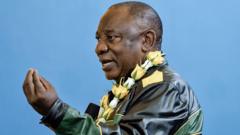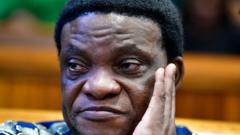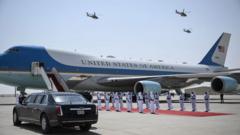As President Cyril Ramaphosa gears up for his first meeting with Donald Trump at the White House, he faces the formidable challenge of repairing strained diplomatic relations between South Africa and the United States, particularly focusing on trade agreements amidst ongoing controversies.
Ramaphosa's Diplomatic Mission: Can He Bridge the Gap with Trump?

Ramaphosa's Diplomatic Mission: Can He Bridge the Gap with Trump?
South Africa's President Cyril Ramaphosa prepares for a crucial meeting with Donald Trump, hoping to mend ties amid escalating tensions between the two nations.
In a historic visit that marks President Cyril Ramaphosa's first meeting with US President Donald Trump, South Africa finds itself at a diplomatic crossroads. The stakes are high, as Ramaphosa aims to mend the fractured relationship between his nation and the United States while deploying his renowned negotiating skills, honed during his tenure as chief negotiator for Nelson Mandela.
Trade relations are at the forefront of Ramaphosa's agenda. Speaking in Washington, he emphasized the importance of nurturing ties with the US, stating, "We want to come out of the United States with a really good trade deal." However, the context is fraught with tension, stemming from fiery accusations made by Trump regarding the plight of South Africa's Afrikaner community, which the South African government has vigorously denied.
The tensions have escalated considerably since the passing of a controversial land expropriation bill, signed by Ramaphosa soon after Trump's second term began. In response, the Trump administration suspended vital aid to South Africa and voiced support for the Afrikaner community, further straining relations. The expulsion of South Africa's ambassador to the US, Ebrahim Rasool, further aggravated matters, with accusations flying between the two countries.
The risks of Ramaphosa's US visit loom large, according to political analyst Anthoni van Nieuwkerk, who predicts two potential outcomes. One may see a "cordial" discussion resulting in positive developments, while the other could risk further humiliation for Ramaphosa if the meeting focuses on inflammatory topics like claims of genocide against white farmers.
Despite such challenges, Ramaphosa is expected to leverage his charisma and negotiating acumen during discussions. Recognizing the mutual benefits of collaboration, Ramaphosa's spokesperson noted that the meeting is "the beginning of a process" aimed at normalizing relations and enhancing trade. The South African delegation, which includes several key ministers, hopes to engage meaningfully with the Trump administration on trade frameworks and other pressing matters.
As negotiations unfold, one significant element is the African Growth and Opportunity Act (Agoa), a critical trade agreement under which South Africa has thrived. Both sides remain aware that failure to extend this agreement could have dire implications for South Africa's economy. Yet the South African delegation is prepared to explore alternative trade agreements should Agoa not be renewed.
Ultimately, as both nations look to navigate these complex issues, the outcome of this meeting could define the future of South African-US relations, setting a precedent for diplomacy in the years to come. Ramaphosa's ability to find common ground with an unpredictable Trump could determine whether they step away from heated rhetoric and work towards a more collaborative relationship.
Trade relations are at the forefront of Ramaphosa's agenda. Speaking in Washington, he emphasized the importance of nurturing ties with the US, stating, "We want to come out of the United States with a really good trade deal." However, the context is fraught with tension, stemming from fiery accusations made by Trump regarding the plight of South Africa's Afrikaner community, which the South African government has vigorously denied.
The tensions have escalated considerably since the passing of a controversial land expropriation bill, signed by Ramaphosa soon after Trump's second term began. In response, the Trump administration suspended vital aid to South Africa and voiced support for the Afrikaner community, further straining relations. The expulsion of South Africa's ambassador to the US, Ebrahim Rasool, further aggravated matters, with accusations flying between the two countries.
The risks of Ramaphosa's US visit loom large, according to political analyst Anthoni van Nieuwkerk, who predicts two potential outcomes. One may see a "cordial" discussion resulting in positive developments, while the other could risk further humiliation for Ramaphosa if the meeting focuses on inflammatory topics like claims of genocide against white farmers.
Despite such challenges, Ramaphosa is expected to leverage his charisma and negotiating acumen during discussions. Recognizing the mutual benefits of collaboration, Ramaphosa's spokesperson noted that the meeting is "the beginning of a process" aimed at normalizing relations and enhancing trade. The South African delegation, which includes several key ministers, hopes to engage meaningfully with the Trump administration on trade frameworks and other pressing matters.
As negotiations unfold, one significant element is the African Growth and Opportunity Act (Agoa), a critical trade agreement under which South Africa has thrived. Both sides remain aware that failure to extend this agreement could have dire implications for South Africa's economy. Yet the South African delegation is prepared to explore alternative trade agreements should Agoa not be renewed.
Ultimately, as both nations look to navigate these complex issues, the outcome of this meeting could define the future of South African-US relations, setting a precedent for diplomacy in the years to come. Ramaphosa's ability to find common ground with an unpredictable Trump could determine whether they step away from heated rhetoric and work towards a more collaborative relationship.




















